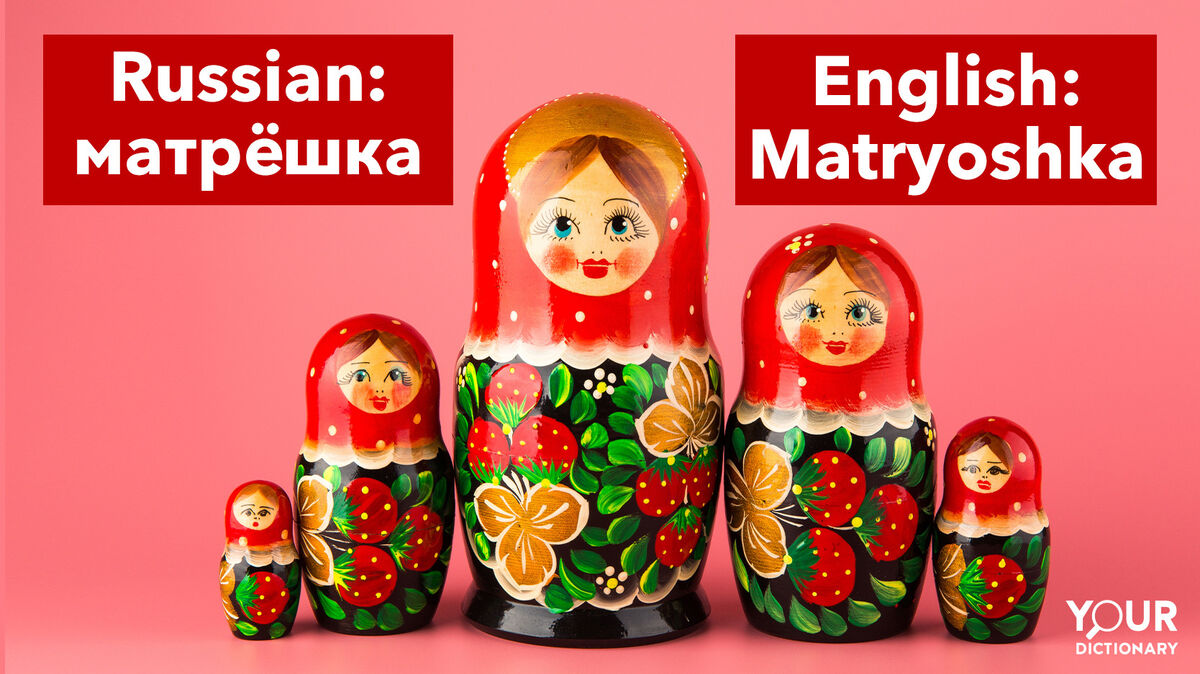
Did you know there are several English words of Russian origin? Languages have borrowed words from each other for centuries and still do today. While many English words are derived from ancient Latin and Germanic languages, there are also loanwords from other languages, including Russian. After Russia became a world power, more Russian words made their way into other languages such as English. Discover a few Russian words used in English that you may have encountered.
Russian Cuisine Names
Several foods enjoyed around the world come from Russia. Here are a few favorites:
blintz - a thin pancake, often stuffed with a filling
borscht - a soup made with beets and vegetables
kefir - a fermented milk drink similar to yogurt
kvass - a fermented wheat beverage
pavlova - a meringue dessert with fresh fruit and whipped cream
pierogi - a stuffed dough dumpling, literally means "pie" in Russian
samovar - a tea urn or tall pitcher that holds hot drinks
ukha - a type of clear fish soup
vodka - an alcoholic drink
Russian Political Vocabulary
Few countries have a political history as rich and tumultuous as Russia. Due to this history, many topical political terms originated in the Russian language.
Bolshevik - a radical or revolutionary, predecessors to the Communists in Russia
boyar - a high ranking member of feudal Russian nobility, second in rank to a prince
commissar - a political officer responsible for providing education
disinformation - derived from the Russian dezinformatsiya; false information or propaganda
gulag - a political labor camp system
intelligentsia - intellectuals who form a political, social or artistic elite
Kazakh - nomadic people of Kazakhstan
Kremlin - a fortress, citadel or castle, generally as a seat of power; a fort where the President of the Russian Federation stays
kulak - a person with liberal values and private property, seen as an opponent of the Communist Party
obshchina - peasant farmers in Russia during imperialist rule: literally “community” or “commune” in Russian
pogrom - organized massacre of an ethnic group, not to be confused with "program"
Soviet - a person, place or thing related to Soviet-era Russia, literally means “council” in Russian
spetsnaz - special agents and officers of the Russian police or military
Stalinism - a form of rigid authoritarian rule under Joseph Stalin
tsar - a historical term for a Russian emperor, also commonly spelled as czar, tzar, or csar in English
Russian Technical Terms
Russia has given us several inventions and, by extension, interesting words and terms.
banya - a traditional steam bath
dacha - a seasonal or second home
elektrichka - an electric train for commuters
sputnik - a series of satellites launched by the Russian space program, literally "traveling companion" in Russian
knout - a type of whip
matryoshka - Russian nesting dolls
Pavlovian - named after physiologist Ivan Pavlov, also called classical conditioning (A process by which a biological subject responds in a specific way to a previously neutral subject.)
ruble - a coin cut from a silver ingot
taiga - a swampy forest between the Siberian tundra and steppes
troika - three things or people working together; a Russian folk dance; a sleigh pulled by three horses
yurt - a round, portable tent
Russian Loanwords Related to Clothing
Russia has a rich fashion history and some clothing items and terms have become popular in English as well.
babushka - in Russian, an endearing term for granny; in English, it refers or a scarf folded diagonally and tied underneath the chin
balaclava - a knitted hat that covers the whole head and neck
parka - a wind-repellent coat with a hood, often lined with fur
Russian Animal Names
Some animals native to Russia have lent their names to English.
beluga - a species of white whale
mammoth - an extinct ancestor of the elephant (In Siberian myths, they lived underground. In English, the word can also be used to mean “huge.”)
Words of Russian Origin: Explore the Language and Culture
Russia is certainly a fascinating country that has lent interesting words to the English language. To hear some of these Russian loanwords in their original Russian form, listen to a native speaker pronounce them. If you are interested in studying the Russian language, explore a list of Russian dictionaries to help you get started.